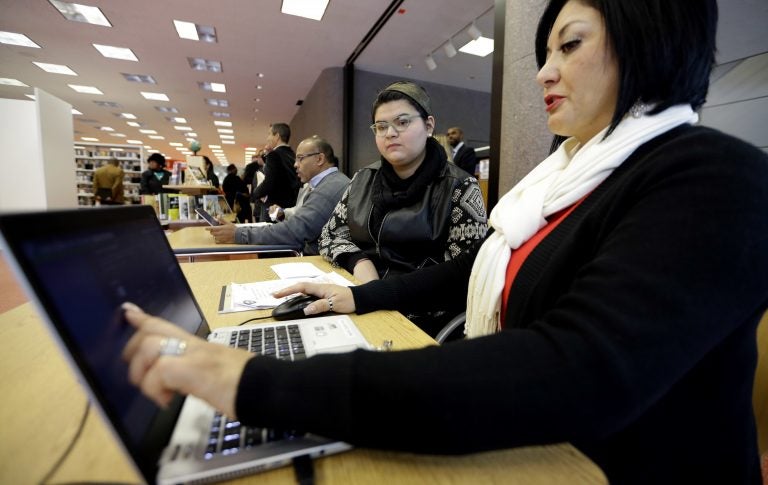Plan for Pennsylvania to take over health insurance marketplace gaining ground
A bill for Pennsylvania to take control of the health insurance marketplace is moving quickly through the state Capitol with bipartisan support.

In this Friday, Nov. 14, 2014 file photo, Affordable Care Act health insurance marketplace navigator Leticia Chaw, right, helps gather information for Jennifer Sanchez to re-enroll in a health insurance plan in Houston. (David J. Phillip/AP Photo)
A bill for Pennsylvania to take control of the health insurance marketplace is moving quickly through the state Capitol with bipartisan support.
House Bill 3 would have Pennsylvania operate the online health insurance exchange that has been run by the federal government since 2014 through the Affordable Care Act.
The bill is being co-sponsored by Lancaster County Republican state Rep. Bryan Cutler and Allegheny County Democratic state Rep. Frank Dermody. Both are their respective parties’ floor leaders.
Under the plan, the Affordable Care Act would remain in effect, along with key provisions like protections for pre-existing conditions, Cutler said.
However, the state insurance department would operate the health insurance marketplace along with a new agency that would be set up.
Pennsylvania pays the federal government about $94 million a year to run the marketplace, Cutler said. With the proposal, Pennsylvania would use technology other states have already shown to be effective to run the marketplace at a much lower cost, which he estimated to be about $35 million annually.
“We can run it more efficiently, and then use those savings to further save money on premiums,” Cutler said.
If the measure passes the House, it will have to be approved by the Senate and signed by Democratic Gov. Tom Wolf, who has voiced support for it.
The state Department of Insurance is “prudently optimistic” the bill will pass, said chief of staff Alison Beam. It could have the plan running by 2021.
Beam noted that the measure would also take advantage of a federal Section 1332 “reinsurance” waiver that can help to lower costs and tailor the program for Pennsylvanians.
Wisconsin, Maryland, Maine, Oregon, Minnesota and Arkansas already use the reinsurance waiver to good effect, Beam said.
Beam emphasized that many aspects of the marketplace, from the insurers to the rules of coverage, would remain the same.
“Products sold are still going to be something they’re familiar with,” Beam added. “The shopping tool will be something that changes from the federal up to the state government.”
WHYY is your source for fact-based, in-depth journalism and information. As a nonprofit organization, we rely on financial support from readers like you. Please give today.





